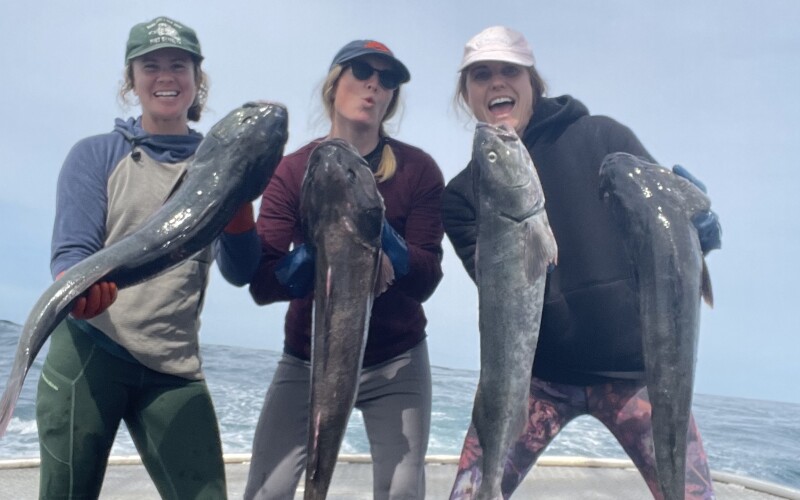Small-scale fishermen in Northern California are working their numbers trying to figure out how to put a year’s earnings together with no salmon season and an early crab closure.
“I’ve been through all this before,” says Heather Sears, calling in from offshore aboard her 42-foot troller, the F/V Princess. “But we make about 70 percent of our income from salmon,” says Sears, who stocks her Fort Bragg, Calif. fish market with her own salmon and crab, as well as black cod and other species.
“They’ve been shutting the crab season early since they got sued,” says Sears. “In 2015 there was a warm water event and we ended up fishing into July and there were some whale entanglements.” In 2017, the Center for Biological Diversity sued California Department of Fish and Wildlife (CDFW) after the number of whale entanglements spiked, but according to a CDFW announcement on March 30, this year’s early closure is attributed to “several entanglements that occurred during March and April of 2022.”
Sears notes that the waters she fishes are still open, while everything south of her zone will close on April 15. “We’re next,” she says. “But we might get until May.”
Dealing with environmental fluctuations and governmental responses to those fluctuations comes into play with the chinook and coho salmon fisheries as well.
“Salmon are on a three-year cycle,” says Sears, “so the salmon we should be catching now all died in the rivers four years ago. There was a drought, and California over-allocated water to the agribusinesses in the San Juaquin Valley, so the water got too warm. Once the water temperature gets over 70 (degrees Fahrenheit) everything goes haywire for those little salmon. They get viruses, parasites, they just don’t make it.”
Sears notes that while the Pacific Fisheries Management Council has not yet officially closed the season, none of the three options the council came up with in March includes a season, so it’s a moot point. Like many fishermen along the California coast, Sears is reviewing her alternatives.
“We posted an April Fool’s joke on Instagram that said we were going to become a charter boat,” says Sears. In reality, she plans to concentrate on black cod and rockfish.
“We went through this in 2007-8 when they closed salmon. I ran all the way to Alaska to fish salmon.” This time Sears won’t have to go so far from home. “Fortunately, we have two rockfish permits,” says Sears. “That will make up for the salmon, except it will take 8 months to earn what we earned in 20 days with salmon.”
Like many fishermen who have survived the ups and downs of the fishing industry, Sears is resilient and optimistic. “I have the fish market, and that’ll help us. I just want to find a way to keep my crew, they’re good.”
Word that the Pacific Fishery Management Council is recommending a full closure to be implemented in May brought an request on Friday from California Gov. Gavin Newsom for a federal fisheries disaster declaration.
“Countless families, coastal communities and tribal nations depend on salmon fishing – it’s more than an industry, it’s a way of life. That’s why we’re requesting expedited relief from the federal government,” Newsom said in announcing the request to the Department of Commerce.







.jpg.small.400x400.jpg)